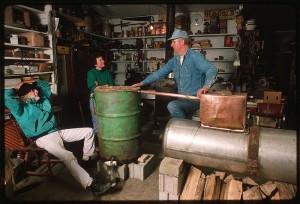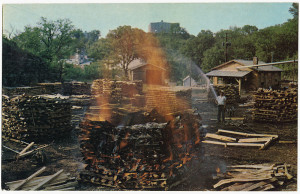The Top 5 For Myths And Misinformation About Volunteer State Whiskey
By Richard Thomas
Given that it’s an American icon and the second-best selling whiskey in the world, that Jack Daniels’ lies at the heart of so many of the classic bar counter debates shouldn’t surprise anyone. It can even be said that, once you exclude Scotch vs. Bourbon, Jack Daniels’ appears in more boozy arguments than any other. The reason is simple: big myths abound about Lynchburg’s giant of Tennessee Whiskey, so much so they often extend to cover Tennessee Whiskey in general.
5. You can make whiskey for personal use in Tennessee: Perhaps it is because moonshining legend Popcorn Sutton called Tennessee home, and perhaps its because of all the billboards advertising legal moonshine around Knoxville and Gatlinburg, but an increasingly pervasive myth is that distilling liquor for personal use is legal in Tennessee. As the myth goes, it’s not the distillation of alcohol that is illegal, but trying to sell it without paying all the various taxes.
No way, no how. Distilling alcohol without the necessary permits is illegal both under Federal law (banning it nationwide) and under Tennessee law. State and Federal taxes are only part of the picture. Just ask the ‘shiners who are periodically busted in the Volunteer State.
4. The “Old No. 7” on Jack Daniels’ labels is his lucky number, is a count of his girlfriends, etc: Jack Daniels’ Lynchburg distillery reports that inquiring about the origins of the Old No. 7 on the label is the most frequently asked type of question on tours, and stories about where that designation come from abound. The most popular myths tell how it just a catchy number, how it was in honor of a friend of Mr. Daniels who owned seven stores, how it was his seventh formulation, and so on.
According to Jack Daniels biographer Peter Krass, the real answer is that the distillery was located in the state’s 7th tax district. A later reorganization placed it in the 16th district, but Daniels didn’t want to confuse his customers by changing the number. Thus No. 7 became Old No. 7.
3. Tennessee Whiskey is just a made up marketing gimmick. Another Jack Daniels specific myth is that the very idea of Tennessee Whiskey is just a made up marketing gimmick by the distillery, and it’s just as wrong as the idea that local law enforcement won’t mind if you make moonshine for personal consumption.
Prior to Prohibition, several U.S. states had a reputation and identity for whiskey-making, and Tennessee was one of them. People used to talk about the merits of Virginia Bourbon and Pennsylvania Rye, and Tennessee Whiskey too.
2. The Lincoln County Process doesn’t matter: A popular claim among detractors of Tennessee Whiskey is that it’s distinctive Lincoln County Process (LCP), or filtration through maplewood charcoal, is meaningless and has no impact on the flavor of the whiskey.
It’s a scientific fact that the activated carbon in charcoal removes fats and acids from new make spirit. Charcoal is such a basic filtration agent it is used in Brita filters and makes an appearance in jury-rigged water filters on just about every survivalist reality TV show ever made. Even as myths and urban legends go, this one is just plain stupid, because the contrary evidence is so widely known.
1.Tennessee Whiskey is just Bourbon, Period: The debate over whether Tennessee Whiskey is bourbon or not was finally settled by the passage of a revised Tennessee Whiskey law in 2013. Comparing the law to Federal whiskey legislation shows that Tennessee Whiskey is exactly like bourbon, but with one extra step: the LCP. This makes Tennessee Whiskey a major, distinctive sub-category within Bourbon.
So, saying Tennessee Whiskey is Bourbon is correct, but saying it is merely Bourbon is not. Keep in mind that the celebrated regional distinctions of Scotch Whisky are based on things far less substantial than the LCP, so saying Tennessee Whiskey is just another Bourbon is like saying terrior doesn’t matter.
 The Whiskey Reviewer A World of Whiskey, Poured Every Weekday
The Whiskey Reviewer A World of Whiskey, Poured Every Weekday



